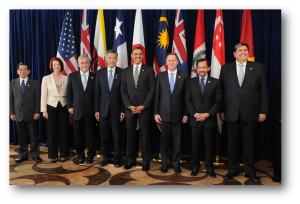Historic. Landmark. Groundbreaking. Revolutionary. These are among many of the words that have been used lately to describe the Trans-Pacific Partnership (TPP) trade pact, which was finally signed in Atlanta last Monday by 12 participating Pacific Rim nations.
Other words that could be used are: Disastrous. Detrimental. NAFTA. Essentially, the TPP is meant to deliver unprecedented free and fair global trade among the 12 participant nations. Once ratified by each country’s congress or parliament — which is likely to happen in early 2016 — many as 18,000 tariffs are expected to be eliminated. It will remove barriers to foreign investment, streamline customs procedures and create an international investor-state dispute settlement (ISDS) system, in addition to much more.
Currently, the 12 members control more than a quarter of all global trade, representing close to $10 trillion, but it is estimated that after TPP is put into place, they will control approximately 50% of all trade. Additionally, if China joins this trade agreement, the percentage will only increase. China has chosen not to join due to the strict regulations and restrictions placed on trade by the TPP, but many believe that it will join in the following years due to the huge predicted success of TPP.
While TPP may seem like sunshine, rainbows, and the solution to all global economic problems, it is quite the opposite for America. TPP is essentially an extension of the North American Free Trade Agreement (NAFTA) which has spurred massive U.S. trade deficits and job loss, downward pressure on wages, unprecedented levels of inequality and new floods of agricultural imports. The TPP not only replicates, but expands NAFTA’s special protections for firms that offshore U.S. jobs. U.S. TPP negotiators even used the 2011 Korea Free Trade Agreement – under which exports have fallen and trade deficits have surged – as the template for the TPP. Many American progressives, like Hillary Clinton, Bernie Sanders, and Sen. Elizabeth Warren, as well as very few conservatives, are decrying the TPP for its poor pharmaceutical policies, movement to offshore American jobs and increased income inequality, ability to empower corporations to challenge US environmental and health safeguards, and undermine human rights.
Most of this would occur because the TPP would elevate individual foreign firms to equal status with sovereign nations, empowering them to privately enforce new rights and privileges provided by the pact by dragging governments to foreign tribunals to challenge public interest policies that they claim frustrate their expectations. The tribunals would be authorized to order taxpayer compensation to the foreign corporations for the “expected future profits” they surmise would be inhibited by the challenged policies.
Additionally, the only information about the TPP is thanks to leaks – the public is not allowed to see the draft TPP text. Even members of Congress, after being denied the text for years, are now only provided limited access. Meanwhile, more than 500 official corporate “trade advisors” have special access. This limited access is concerning, as this trade agreement will affect millions worldwide, including the entire American working class. Obama should consider the wellbeing of his own citizens before he signs NAFTA 2.0.


